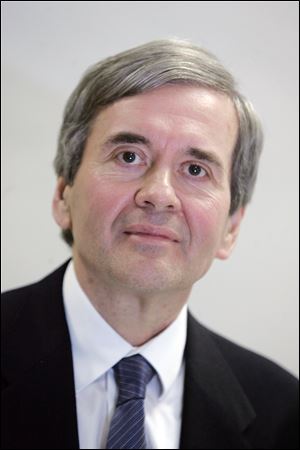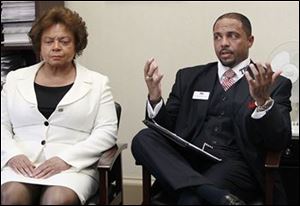
COMMENTARY
TPS aims to convert civic pride to tax dollars
6/29/2014
Kushma

Kushma
If sheer exuberance could persuade voters to pass the tax increase that Toledo Public Schools is seeking, Superintendent Romules Durant could start banking the proceeds now. His enthusiasm for his job, and for the vision he expresses of the school system’s prospects, is infectious.
But Mr. Durant, the Toledo Board of Education, and other district leaders know it will take more than ebullient talk to get hard-pressed city homeowners to open their wallets and approve the levy on November’s ballot. They say they’re ready to make their case.
“You don’t campaign for a levy — you campaign to promote the district,” the superintendent told me last week. “Voters don’t want to hear about dollars. They want to hear about what we’re doing with our students.
“We need this [levy] to continue to transform our schools,” he says. “That will revitalize the economy of Toledo.”
The proposed five-year, 5.8-mill tax would cost the owner of a $100,000 home in the district an additional $203 a year. It has three main purposes: Its adoption would enable TPS to restore student bus transportation services that it slashed in 2010 to keep its budget balanced during the Great Recession. Today, even a kindergartner in TPS must walk as far as four miles a day to and from school, in weather that is often unpleasant and through neighborhoods that can be sketchy.
Revenue from the tax increase also would provide a pool of money that TPS could tap to attract and keep talented teachers and administrators, rather than watch them depart for better-paying suburban systems. And it would allow the district to make technology upgrades and perform other needed maintenance at its schools.
Gaining voters’ support is likely to be a tough slog. TPS voters strongly approved a millage renewal just last year, but some taxpayers may not appreciate the district’s return to the ballot so soon.
Tax increases are much harder to pass than renewals; voters rejected a TPS request for new money two years ago. The district hasn’t had a tax increase since 2001.

Cecelia Adams, president of the Toledo Board of Education, and Romules Durant, superintendent of Toledo Public Schools, portray the district’s tax request as an investment in the city’s future.
Three other worthy local institutions — Lucas County Children Services, the Area Office on Aging of Northwestern Ohio, and the Mental Health and Recovery Services Board of Lucas County — also seek to place property tax issues before voters in November. That creates the prospect of ballot fatigue, however compelling the arguments each group can make.
The TPS levy campaign will compete for voters’ attention this summer and fall with high-profile statewide contests, led by Gov. John Kasich’s re-election bid. Mr. Durant may have trouble getting himself heard over the political din, despite his full schedule of appearances before community and business groups and at churches every Sunday.
Toledoans can be forgiven for feeling tax-averse these days. Even as home values in the city remain slow to recover from the recession, TPS must rely increasingly on property taxes paid by homeowners to meet its operating and construction needs.
That’s largely a result of state government’s shameful long-term default on providing adequate, equitable aid to public schools. Governor Kasich and the General Assembly have perpetuated that failure, even as they have cut taxes for the richest Ohioans.
TPS Treasurer Matthew Cleland observes that the district will get less financial aid from Columbus in the next school year than it did in 2009. He notes that inflation, reflected in the higher costs of things the district must buy, hasn’t gone down during that period.
A study released last week by the Columbus-based Education Tax Policy Institute concludes that over nearly four decades, changes in state tax policy have shifted tax burdens to homeowners and farmers, and away from businesses. In 1991, residential taxes accounted for roughly 40 percent of all TPS property taxes. Today, that figure approaches 60 percent.
TPS didn’t create these conditions, but must live with them. So district officials are portraying their tax request as an investment in young people who will become the city’s next generation of workers and taxpayers, and in maintaining Toledo property values by supporting schools where parents will want to send their children.
“If you invest at this end, you’ll have fewer problems when our young people become adults,” says school board president Cecelia Adams. “We’re making progress academically. Students are performing. We’re fiscally conservative and cost-efficient. We’re not wasting money, but we’ve stretched things as far as we can. We need 5.8 [mills].”
Mr. Durant offers examples of continued improvement in TPS since he became superintendent last August. He cites the five-year grant given the school district this month by the U.S. Department of Health and Human Services to provide Head Start services to more than 1,100 local preschool children. Like a lot of other folks, though, he is perplexed by the feds’ unexplained decision to divide the Head Start contract between TPS and an out-of-town, for-profit provider.
He notes the district’s mobilization during the past school year to raise the share of TPS third-graders who read at grade level from about half last fall to more than three-fourths at year’s end. That’s still too low. But the district’s performance exceeded that of local charter schools, and will prevent large numbers of TPS students from being held back because of Mr. Kasich’s punitive third-grade reading mandate.
The superintendent identifies other elements of the district’s transformation plan: single-sex programs, broader career and internship options, reduced rates of student suspensions, enhanced online instruction, an expanded breakfast program. Such improvements are at risk, he warns, if voters reject the TPS levy.
“This district is putting its best foot forward in a challenging environment,” Mr. Durant says. “Our ‘TPS Proud’ culture has taken on a life of its own. Now we need this community’s support.”
David Kushma is editor of The Blade.
Contact him at: dkushma@theblade.com or on Twitter @dkushma1